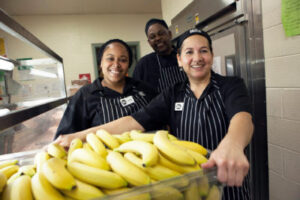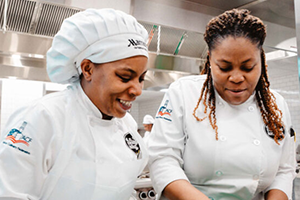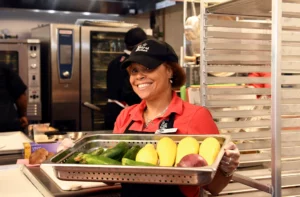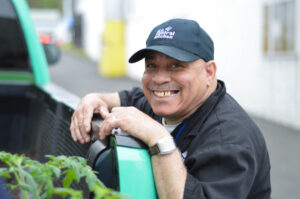DCCK Director Procurement Amy Bachman on food waste prevention
Food isn’t just a tool we use to strengthen bodies, empower minds, and build communities. It’s also a tool we use to replenish the Earth.
That’s why we intentionally designed our new home at The Michael R. Klein Center for Jobs & Justice to prioritize green initiatives in our day-to-day operations. From recycling Personal Protective Equipment (PPE) products to using more fuel-efficient systems, our building embodies sustainability.
Since The Klein Center features a large working kitchen, we inevitably produce some food waste. But how do we minimize our impact? To prevent food waste, we have traditionally composted our leftover food products. While we continue to compost using LeanPath technology, we now house one of the nation’s largest on-site biodigesters. Our biodigester lowers our energy costs, reduces our carbon footprint, and keeps food waste out of landfills.
The name “biodigester” may sound complicated and intimidating, but the process of transforming food waste into organic compounds to replenish the Earth is quite simple. Read below to learn more about the process of bio-digesting and how this unique machine is transforming our planet for the better.
What is a biodigester?
A biodigester is an airtight machine that transforms organic compounds (like uneaten produce and proteins) into liquids for the sewage system.
How does a biodigester work?
Our kitchen staff prepares thousands of meals each day for neighboring non-profits, shelters, and schools. We do our best to use as much of our food products as possible, but sometimes food needs to be thrown away. When we throw out kitchen scraps, we put them in the biodigester. The biodigester uses enzymes during an aerobic process to break down food waste into liquids, which then trickles out into the sewage system.
Why do we use a biodigester?
“Food recovery has always been a part of our mission,” says DCCK Director of Procurement Amy Bachman. “What’s exciting about this building is that we not only are able to recover food, but we can also really look at our own waste streams ourselves. We are a no waste building.”
As we work toward creating a greener kitchen, our biodigester allows us to transform our waste to create a healthier environment for our staff, our community, and our planet in the process.





